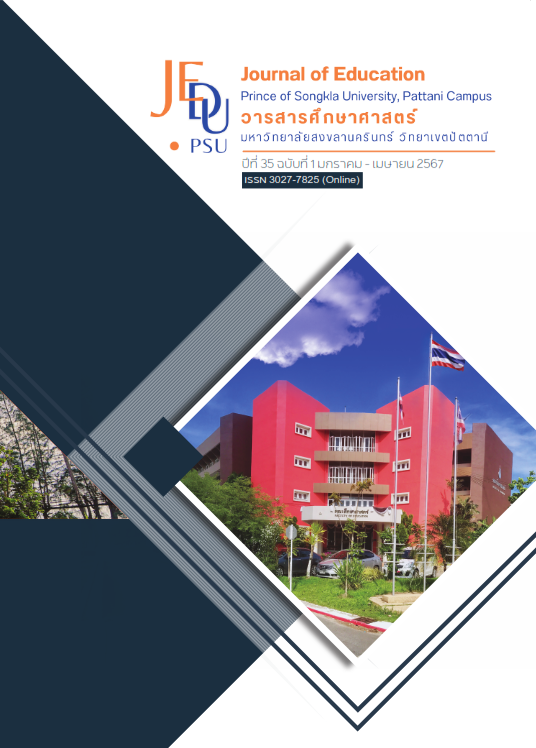การพัฒนามาตรฐานตัวชี้วัดด้านผู้เรียน สำหรับการประกันคุณภาพภายในสถานศึกษาของสถานศึกษานำร่องพื้นที่นวัตกรรมการศึกษา จังหวัดยะลา
Main Article Content
บทคัดย่อ
นวัตกรรมการศึกษา จังหวัดยะลา และ 2) ตรวจสอบคุณภาพของมาตรฐานตัวชี้วัดด้านผู้เรียน โดยใช้ระเบียบวิธีวิจัยแบบผสมผสาน แบ่งเป็น 2 ระยะ ระยะที่ 1 พัฒนามาตรฐานและตัวชี้วัด สำหรับการประกันคุณภาพภายในสถานศึกษาของสถานศึกษานำร่องพื้นที่นวัตกรรมการศึกษา จังหวัดยะลา ด้วยการวิจัยเชิงคุณภาพ ผู้ให้ข้อมูลสำคัญ 7 คน ระยะที่ 2 ตรวจสอบคุณภาพมาตรฐาน และตัวชี้วัด ด้วยการวิจัยเชิงปริมาณ กลุ่มตัวอย่าง จำนวน 500 คน ประกอบด้วย ครูและบุคลากรทางการศึกษาในสถานศึกษานำร่องพื้นที่นวัตกรรม นักวิชาการด้านการศึกษา และคณะกรรมการขับเคลื่อนพื้นที่นวัตกรรมการศึกษาจังหวัดยะลา ยึดอัตราส่วนของตัวแปรต่อกลุ่มตัวอย่าง 1: 20 โดยใช้ตัวแปรจากระยะที่ 1 สุ่มแบบแบ่งชั้นตามสัดส่วน เครื่องมือเป็นแบบสอบถามมาตราส่วน ซึ่งมีค่าความเชื่อมั่นเท่ากับ 0.824 วิเคราะห์ข้อมูลด้วยสถิติพื้นฐานและการวิเคราะห์องค์ประกอบเชิงยืนยัน
ผลการวิจัย พบว่า มาตรฐานตัวชี้วัดด้านผู้เรียนสำหรับการประกันคุณภาพภายในสถานศึกษาของสถานศึกษานำร่องพื้นที่นวัตกรรมการศึกษา จังหวัดยะลา ควรมีจำนวน 6 มาตรฐาน 32 ตัวชี้วัด ประกอบด้วย มาตรฐานด้านผลสัมฤทธิ์ทางวิชาการและความสามารถพื้นฐาน 4 ตัวชี้วัด ด้านทักษะภายในตัวเอง 6 ตัวชี้วัด ด้านทักษะด้านมนุษยสัมพันธ์ 5 ตัวชี้วัด ด้านทักษะทางเทคโนโลยีดิจิทัล 6 ตัวชี้วัด ด้านคุณลักษณะที่พึงประสงค์ 7 ตัวชี้วัด และด้านความคิดขั้นสูง 4 ตัวชี้วัด ผลการตรวจสอบคุณภาพมาตรฐานและตัวชี้วัด พบว่ามีความเหมาะสมสอดคล้องกัน
ผู้บริหารสามารถใช้ผลการวิจัยดังกล่าวเพื่อเป็นแนวทางในการส่งเสริม กำกับดูแล ตรวจสอบ ประเมินผล เพื่อการประกันคุณภาพการศึกษาต่อไป
Article Details

อนุญาตภายใต้เงื่อนไข Creative Commons Attribution-NonCommercial 4.0 International License.
เอกสารอ้างอิง
Akçayır, M., & Akçayır, G. (2017). Advantages and challenges associated with augmented reality for education: A systematic review of the literature. Educational Research Review, 20, 1-11.
Announcement in educational sandbox area policy committee. (2021). Performance Appraisal Criteria and Management in Educational Innovation Area B.E. 2564. Royal Gazette Vol. 138, 313.
Buntham, A. & Chusuwan, R. (2020). Guidelines for Learning Management Based on the TPACK Model Concept in the Sandbox-Pilot Schools Under Pattani Secondary Education Area Office. National and international conference on education. (9th ed.). Prince of Songkla University, Pattani Campus p.1006-1019.
Cheonghom, A., Chalakbang, C., Wongchachom, C. & Phengsawat, W. (2015). Development of a primary school administration model which affects the quality of students. Journal of education of Khon Kean University, 38(3), 193-202.
Cheyama, N. & Chukamnurd, W. (2022). Conditions, Challenges and Guidelines for Educational Sandbox Area Policy Implementation in School in Pattani Province: A Case Study of an Extra-Large Secondary School. Nation and international conference on education. (9th
ed.). Prince of Songkla University, Pattani Campus. p.1311-1326.
Chularut, P. (2018). Learning management for students in the Thailand 4.0 era. Veridian E-Journal Silpakorn University, 11(2), 2363-2380.
Educational sandbox area act. (2019). Royal Gazette Vol. 136 (56a.)
Hair, J. F., Anderson, R. E., Tatham, R. L. & Black, W.C. (1998). Multivariate data analysis. (5th ed). Prentice-Hall.
Hartson, H. R., & Pyla, P.S. (2012). The UX book: Process and guidelines for ensuring a quality user experience. Morgan Kaufmann.
Hsiao, H.-S., Lin, C.-H., & Yang, Y.-T. C. (2019). The influence of outdoor sand-based learning on students' creative thinking and problem-solving ability. Sustainability, 11(2), 370. doi:10.3390/su11020370.
Jansuwan, S. (2015). The development of student standards in basic education: A case study in Pakkranpittay School. [Minor thesis, Ayuttaya Rajabhat University].
Jarernrak, K. (2022). Competency based curriculum development of education sandbox pilot schools in Rayong Primary Educational Service Area Office 2. Journal of UBRU educational review (Online), 2(1),15-28. https://so06.tci-thaijo.org/index.php/JER/article/view/250491.
Ministry of Education, Singapore. (MOE). (2010). Nurturing our young for the future: Competencies for the 21st Century. Singapore: MOE
Ministry of education. (2011). Law of basic education in internal quality assurance in school B.E.2554: Agriculture Cooperative Community of Thailand. [In Thai].
Ministry of education. (2018). Law of educational standards for kindergarten level, K-12 level and special education center in basic education level B.E. 2561: Agriculture Cooperative Community of Thailand. [In Thai].
Moleewong, N. & Suwathanpornkul, I. (2018). The development of standards, indicators, and criterions for internal quality assurance of Srinakharinwirot University Demonstration Schools. KKU research journal of humanities and social sciences (Graduate studies), 6(2), 52-66.
National Core Curriculum for Basic Education. (2014). The Finnish National Agency of Education.
Newmann, F. M., et al. (1996). Authentic achievement: Restructuring schools for intellectual quality. Jossey-Bass.
Office for national education standards and quality assessment (Public organization). (2011). Guideline for external quality assessor in the third round. https://www.onesqa.or.th/th/content-view/921/862/
Office for national education standards and quality assessment (Public organization). (2016). Indicators and criteria ONEC in the 4th round. https://www.sw2.ac.th/images/user/NUT/p_sw2/p4.pdf
Office of education council. (2018). Thai educational status in 2016-2017: Guideline of Thai education reform forward to the new era. Prikwan Graphic.
Office of education council. (2019). National standards of Thailand B.E. 2561. Cencchuri
Office of the Teacher Civil Service and Educational Personnel Commission. (2015). The manual for teacher performance appraisal in career path. https://otepc.go.th/images/00_YEAR2564/03_PV1/w9_2564_24052564.pdf
Pongpajon, C. (2018). The States and Problems of Peacebuilding Education Development of Government Schools in 3 Southernmost Provinces of Thailand. Journal of Social Sciences and Humanities. 44(2), 116-157.
Poogun, N. (2010). The development standards indicators and assessment criteria of characteristic of students in Hatyai Municipal. [Master's thesis, Taksin University]
Shepard, L. (2000). The role of assessment in a learning culture. Educational Researcher, 29(7), 4-14.
Sirirat, Y., Wangthanomsak, M. (2019). Educational quality indicators of primary school. Veridian E-Journal Silpakorn University, 10(1), 488-510.
ThaiPBS. (2022). Looking at educational problems in Yala Province : Aims to create a provincial curriculum to solve the problem. https://www.thaipbs.or.th/news/content/311413.
Thomas, J. W. (2000). A review of research on project-based learning. San Rafael, Autodesk Foundation.
UNESCO Office Bangkok and Regional Bureau for Education in Asia and the Pacific. (2016). School and teaching practices for twenty-first century challenges: lessons from the Asia-Pacific region, regional synthesis report;2014 regional study on transversal competencies in
education policy and practice (Phase II). https://unesdoc.unesco.org/images/0024/002440/244022E.pdf
Wang, H., Pan, Y., & Yang, S.-J. H. (2020). Effects of virtual reality and augmented reality on science learning outcomes: A meta-analysis. Educational Research Review, 30,100326.doi:10.1016/j.edurev.2020.100326


